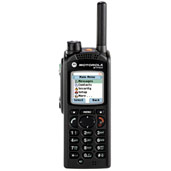 A Decade of Success for Mission-Critical Professional Mobile Radio Standard
A Decade of Success for Mission-Critical Professional Mobile Radio Standard
Ten years ago, Motorola, Inc. signed the world's first commercial contract to deploy Terrestrial Trunked Radio (TETRA), the standard for professional mobile radio (PMR). From that single contract in 1996 with Oslo's Gardermoen Airport in Norway, Motorola's TETRA technology has been deployed around the world, delivering mission and business-critical capability to government and commercial customers.
This anniversary celebration comes in a year that has seen many more TETRA wins for Motorola, including the major contract to deliver a nationwide TETRA network to the Portuguese government for use by all the country's emergency services, and the contract to implement a TETRA network for Shanghai Telecom to serve Shanghai, one of the largest cities in the world. This year also sees Motorola bringing to market the world's first PDA data device for use on TETRA networks, another significant milestone in improving customers' operations.
TETRA technology enables fast, secure and accurate access to mission-critical information, reduces reaction time and gives public safety officers greater freedom and flexibility for effective work within their community, whether managing major events or routine tasks. Relevant information means more rapid response. A remote license plate check before a 'stop and search' could alert a police officer if the vehicle is reported as stolen. Firefighters can interrogate information databases en route to an incident to confirm if hazardous materials are stored on the affected premises. Paramedics can communicate to a hospital ahead of arrival, transmitting vital information about the casualty.
The private sector too is turning to TETRA to enhance business communications. In particular, two major areas of enterprise -- transportation and utilities -- have been quick to see the benefits of taking to TETRA. Train, tube and bus companies are increasingly choosing TETRA technology to keep drivers in touch and manage fleets and timetables. Meanwhile, oil, gas and water suppliers are using the radio standard for purposes as diverse as remotely monitoring water levels, managing security personnel, and communicating with helicopter pilots. Other industries driving commercial take-up of TETRA radio include retail and wholesale, construction and manufacturing.
Faris Habbaba, responsible for Motorola's global TETRA product portfolio said: "TETRA has developed into the world's leading standard for secure, flexible and function-rich radio networks, relied upon by the public and private sectors alike. We are proud to be celebrating our achievements in TETRA technology, and to recognize that we have a solid foundation on which to build the new generation of professional mobile radio systems and services."
Phil Kidner, CEO of the TETRA Association, said: "TETRA offers a level of performance that confirms its place in the world's communications market. As an open and interoperable standard, the success of TETRA has been achieved through, and is underpinned by, the effective co-operation of the industry."
TETRA is the open standard for PMR as defined by ETSI (European Telecommunications Standards Institute). Motorola has been instrumental, together with other TETRA industry players, in supporting the standard since its inception in the late 1980s. TETRA has evolved to become a mission- critical tool in public safety and has been rolled out across 77 countries worldwide. Motorola continues to work with industry partners, the TETRA Association and ETSI to drive the standard forward.

Add a Comment
No messages on this article yet